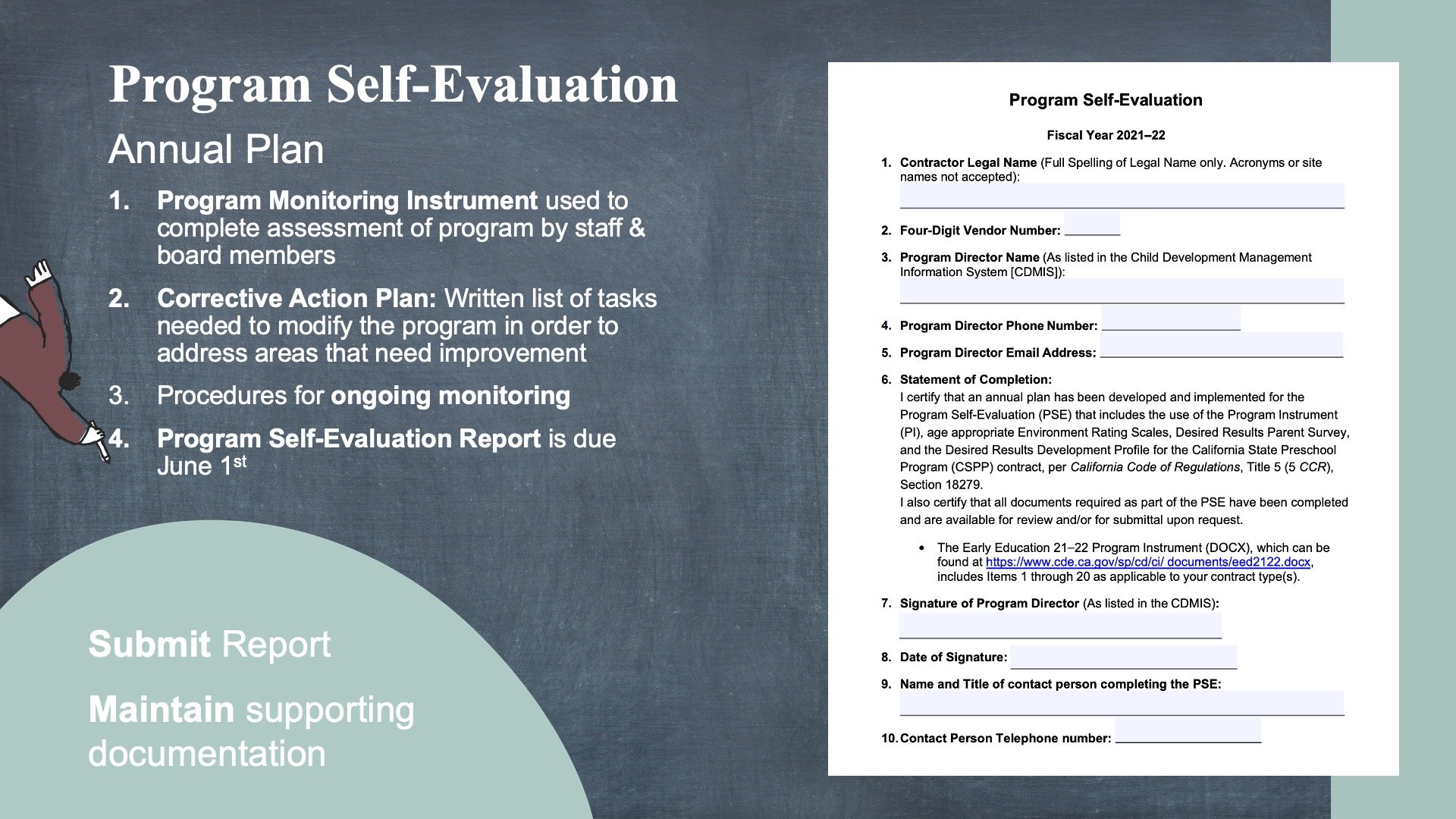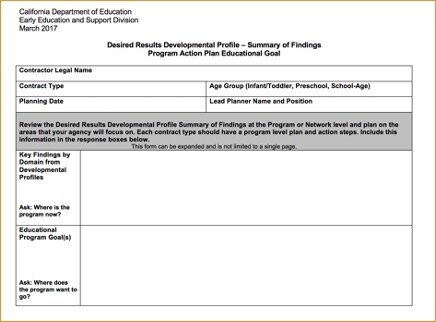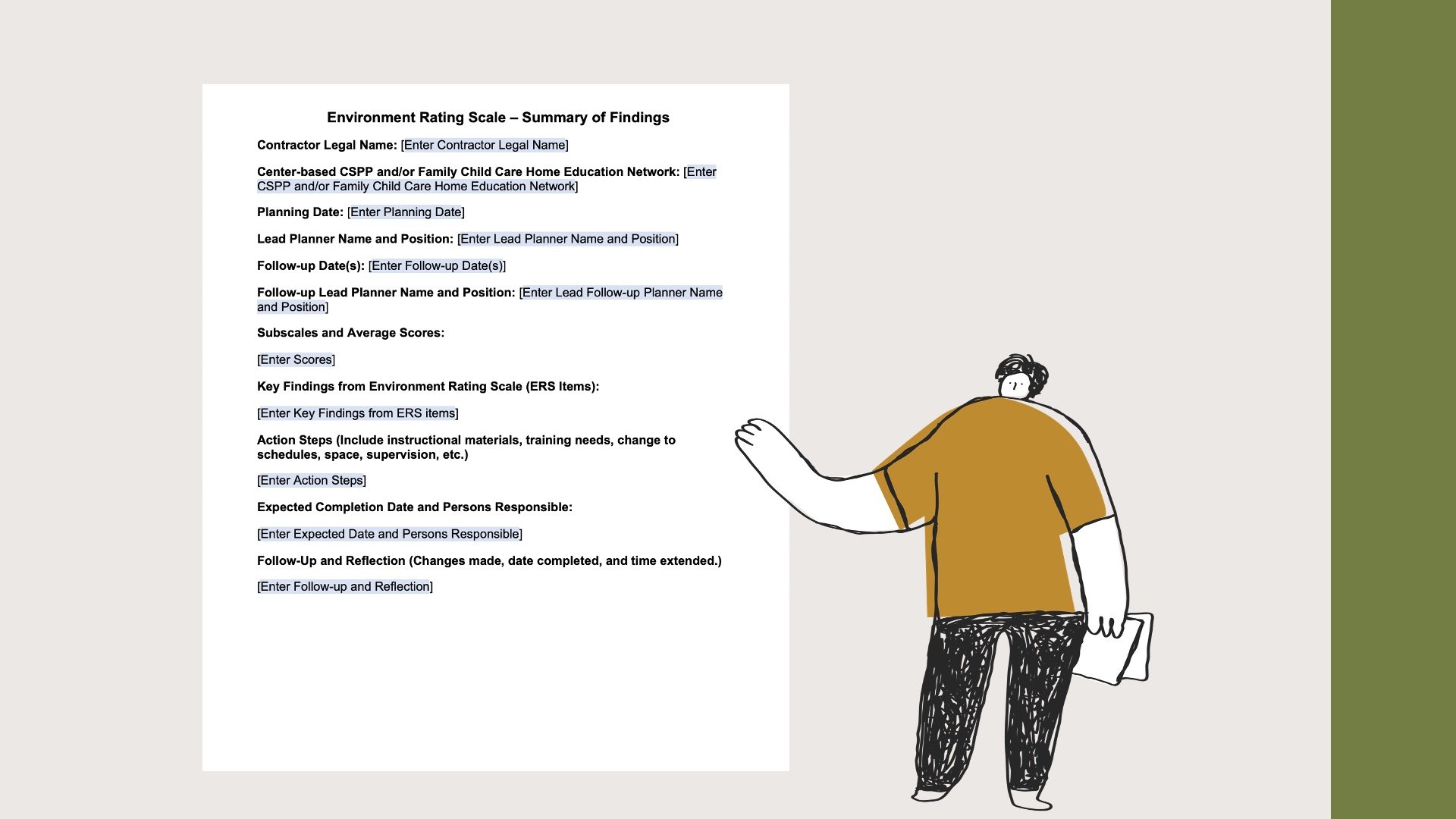Lesson
Dashboard
Lesson 1
Family Selection
Lesson 2
Family Data File
Lesson 3
Attendance
Lesson 4
Parent Involvement & Education
Lesson 5
Health & Social Services
Lesson 6
Site Licensure & License Exempt
Lesson 7
Staff-Child Ratios
Lesson 8
Classroom Assessment System
Lesson 9
Nutritional Needs
Lesson 10
Desired Results Profile & Data
Lesson 11
Qualified Staff & Director
Lesson 12
Staff Development Program
Lesson 13
Refrain from Religious Instruction
Lesson 14
Inventory Records
Lesson 15
Annual Evaluation Plan
Compliance
Indicator
The program has developed and implemented an annual evaluation plan that addresses any areas identified during the self-evaluation as needing improvement.
Regulations/Reference
EED Program Instrument: IV. Administrative EED 21
Education Code: 8202, 8203.3, 8207, 8231 & 8314
Title 5: 17700(as), (aw), 17702, 17709–17711, & 17794
Monitoring Review Evidence
Annual Program Self-Evaluation
Written List of Tasks
Ongoing Monitoring
Watch Video Lesson ❯
Sample Forms/Tools ❯
Review Sketch Pad Notes ❯
Program Self-Evaluation Notification
Around March or April of every program year, a Management Bulletin is released with instructions & timelines for the program self evaluation report submittal. Information & forms may be found on the department’s website at anytime.
Annual Plan
The regulations require that contractors develop an annual self-evaluation plan that includes specific elements including the use of the Program Instrument used to complete an assessment of the program by staff & board members.
Note: The Program Instrument is the same tool used for both the annual self-evaluation & by CDE when it’s time to conduct your state program monitoring review.
The Program Instrument includes 5 key dimensions:
Family Files
Family Engagement
Program Quality
Administrative
Fiscal/Audit
The regulations state that the contractor shall modify its program to address any areas identified during the self-evaluation as needing improvement.
What this might look like in a program:
Contractors build a schedule into their Annual Plan to analyze & follow-up the agency goal progress.
Program Self-Evaluation
As part of the Program Self-Evaluation process, each item that applies to each contract type is to be reviewed to ensure compliance & identify any gaps.
Based on the findings, a corrective action plan or written list of tasks needed to modify the program in order to address all areas that need improvement is documented on the Program Review Instrument Summary of Findings & Action Plans form.
An ongoing monitoring plan must be in place to assure contractors continue to meet program standards, & areas requiring modification are addressed in a timely & effective manner.
Contractors will complete the EED 4000 Program Self-Evaluation to satisfy the submission requirements for the PSE & submit electronically to CDE by June 1, 2022.
What this might look like in a program:
Contractors develop a Monthly Planner to ensure follow-up is not forgotten & intentionally include action plan follow-up into an agency plan.
Desired Results Developmental Profile (DRDP) & Data
DRDP data is analyzed at the program level by age group as part of the self-evaluation process. Based on the findings, we are instructed to define at least one educational goal to address important issues & document it on the Summary of Findings Program Action Plan Educational Goal form.
Contractors should develop attainable actions steps & identify expected completion dates & persons responsible.
What this might look like in a program:
Contractors include quarterly check-in within their Monthly Planner to ensure follow-up is completed & documented.
Environmental Rating Scale (ERS)
The program must complete an Environment Rating Scale (ERS) to measure program quality for the appropriate age group & setting and shall achieve a rating of “Good,” defined as scoring at least an average of 5.0 on each subscale of the environment rating scale.
During the 2022-23 fiscal year, contractors should follow guidance from Use of the Environment Rating Scales during Pandemic Conditions.
Contractors will complete the Environment Rating Scale- Summary of Findings & identify two items that indicate a need for improvement within each subscale.
NOTE: A need for improvement would be subscales whose average score is below “5.0”. For those contractors with only subscale averages of five (5) or higher, select one item that indicates a need for improvement from each of the two lowest scoring subscales
Contractors should develop attainable actions steps & identify expected completion dates & persons responsible.
What this might look like in a program:
Contractors complete the Summary of Finding including action steps & include expected completion dates & persons responsible. The follow-up & reflections section will be blank.
Include quarterly check-ins within the Monthly Planner
Record modifications or changes needed to complete the Action Steps, & expected completion dates.
Reflect on the results & record progress or changes made to the key finding(s)
Desired Results Parent Survey
The Desired Results Parent Survey is distributed annually as part of the Program Self-Evaluation process. Parents may choose to complete the survey on paper or electronically.
After surveys are completed & results are tallied, key findings are identified & documented on the Parent Survey Summary of Findings.
At the time of planning, develop attainable action steps intended to support the program in progressing from Not Satisfied to Satisfied OR Very Satisfied & No to Yes.
Follow-up should occur throughout the program year & reflections on progress should be documented.
NOTE: During the following program year self-evaluation, data will be analyzed to see if the identified area had improved. If no improvement, adjustments will be made.
What this might look like in a program:
Contractors include the distribution & collection timeline of the Desired Results Parent Surveys within the Annual Self-Evaluation & Monitoring Plan.
Complete Knowledge Check ❯
After reviewing the video lesson & sketch pad notes, it’s time to check for understanding by completing a Knowledge Check. Note that Individual Knowledge Checks will conclude with a Certificate.









